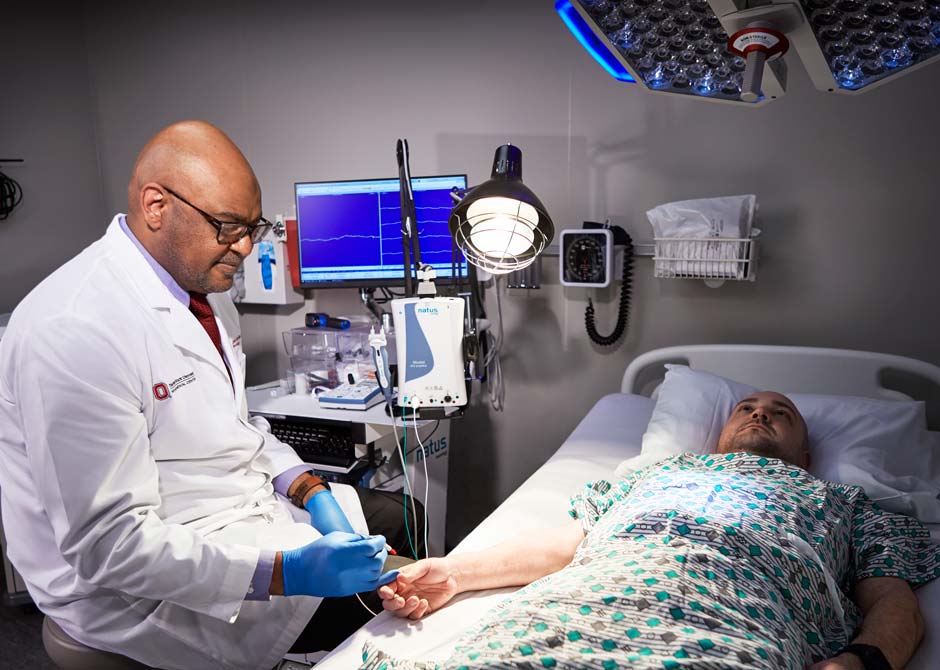 Experiencing symptoms like muscle weakness, muscle loss, numbness or balance issues can be alarming and greatly impact your quality of life.
Experiencing symptoms like muscle weakness, muscle loss, numbness or balance issues can be alarming and greatly impact your quality of life.
The neuromuscular specialists at The Ohio State University Wexner Medical Center understand that and want to help you figure out just what is causing your symptoms. We welcome the rarest, most complicated and difficult-to-diagnose problems.
As one of the largest centers for neuromuscular disorders in the United States, our Division of Neuromuscular Medicine sees all major categories of conditions that affect the nervous system, including the motor and sensory nerves that connect the brain and spinal cord to the rest of the body. These diseases are often debilitating, so they require experienced and compassionate providers to manage.
Our multidisciplinary model of neuromuscular care, built on over four decades of a team-centered approach, is made up of experts experienced at treating all types of neuromuscular conditions. Our dedicated staff will develop a personalized care plan for you and support you and your family during your entire illness.
What are neuromuscular disorders?
Neuromuscular disorders include a wide range of diseases that affect the nerves that control muscle movement. As nerve cells (called neurons) deteriorate and die, they become unable to communicate with muscles, causing weakness and atrophy.
The most common symptom of neuromuscular disorders is progressive muscle weakness. Other symptoms vary based on the type of neuromuscular disorder you have.
These conditions can be genetic, meaning they’re inherited from a parent. Some of them are highly treatable if care is managed by a team experienced in neuromuscular disorders.
Types of neuromuscular disorders treated at Ohio State
The neuromuscular specialists at the Ohio State Wexner Medical Center treat a variety of diseases that have varying symptoms and prognoses. Some of the disorders we see here include:
- Amyotrophic lateral syndrome (ALS), also called Lou Gehrig’s disease
- Muscular dystrophy
- Myasthenia gravis
- Myositis
- Peripheral neuropathy, including chemotherapy-induced peripheral neuropathy (CIPN)
- Spinal muscular atrophy (SMA)
- Other motor neuron disorders
How are neuromuscular disorders diagnosed?
Neuromuscular disorders can be difficult to diagnose because their symptoms are often similar to other conditions. You’ll want to make sure you visit with an experienced neuromuscular disorder physician to help you receive an accurate and timely diagnosis. The neuromuscular disorder team at the Ohio State Wexner Medical Center has decades of expertise identifying these difficult-to-diagnose disorders.
We’ll use several diagnostic tools to rule out other conditions and confirm your diagnosis. Those include:
- Blood tests – These allow us to look for elevated levels of proteins, antibodies and enzymes, which could signal a neuromuscular disorder.
- Genetic testing – Blood and saliva genetic tests can allow us to diagnose the condition if it’s genetic in nature. We have a dedicated neuromuscular genetic counselor who specializes in this.
- Electromyogram (EMG) – This looks at the electric activity (nerve response) of your muscles while at rest and during exercise.
- Neuromuscular ultrasound – A neuromuscular ultrasound uses sound waves to create pictures of nerves and muscles, giving doctors a better understanding of what’s happening with your anatomy.
- Imaging – Sometimes X-rays, computed tomography (CT) scans and magnetic resonance imaging (MRI) are useful in confirming a neuromuscular disorder diagnosis.
- Biopsies – A skin, tissue or muscle biopsy may be performed, too.
Why choose Ohio State for treatment of neuromuscular disorders?
Since neuromuscular disorders are difficult to diagnose and treat, you’ll want to make sure you have the best team possible to work with you throughout your illness. As one of the largest neuromuscular disorders centers in the United States, we’re able to manage the care for any type of neuromuscular disorder, no matter how rare.
Here are some reasons why you should come to Ohio State if you have a neuromuscular disorder or think you might:
Our expertise – We have more than 10 board-certified, fellowship-trained neuromuscular subspecialists, who not only have training in muscular dystrophy, ALS, peripheral neuropathy and myasthenia gravis, but who further specialize in even more rare and uncommon neuromuscular disorders. They’re also experts in physiology, how to administer electromyograms, respiratory issues associated with these disorders and other facets of this specialized care.
Our multidisciplinary team – Our nurses and our physical, occupational and speech therapists have special training to provide therapies designed exclusively for people with neuromuscular disorders. We also have social workers, dietitians and a genetic counselor who work only with people with neuromuscular disorders.
Our resources – As part of a large academic health system, you’ll have access to resources not always available elsewhere. For example, our assistive technology center provides you with equipment and electronic aids, such as wheelchairs and computer devices, to improve the quality of life for those with a neuromuscular disorder.
Our multidisciplinary clinics – We have various specialty clinics that care specifically for the unique needs of people with neuromuscular disorders. These include clinics for muscular dystrophy, myasthenia gravis, myositis, chemotherapy-induced peripheral neuropathy, SMA and ALS/motor neuron diseases. We’re part of both the Muscular Dystrophy Association Care Center Network and the Cure SMA Care Center Network.
Our research – Through our world-class neuromuscular disease research center, you can participate in groundbreaking research and clinical trials that might improve your situation and help find future cures. Currently, our research is focused on gene modification and how these new therapies can impact muscle weakness and usage.
Read more about brain and spine neurological conditions at the Ohio State Wexner Medical Center.
